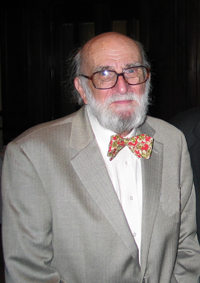 In honor of the College of Medicine’s 125th Anniversary, UNMC Today spoke with some retired faculty members and reflected on their years in the college.
In honor of the College of Medicine’s 125th Anniversary, UNMC Today spoke with some retired faculty members and reflected on their years in the college.
Today we hear from Walter Friedlander, M.D., who founded both the department of neurology (now the department of neurosciences) and the department of medical humanities and jurisprudence (now the department of preventive and societal medicine) at UNMC. Dr. Friedlander retired in 1984.
It has been an amazing experience to be at the rebirth of a medical college and watch it develop from an institution whose existence was being questioned into one of the leading colleges of medicine in this country. In 1910, Abraham Flexnor published the results of his visits to each of the many existing medical schools in the United States. This report was the impetus for a major revolution in medical education. He found little that was good. The only school that he considered adequate was Johns Hopkins, but there were a few other colleges for which he had some praise. One of these select schools was the University of Nebraska College of Medicine. In spite of its position in 1910, something occurred, probably in the late 1930s or 1940s, which resulted in UNMC faltering near the brink of being discontinued. Dr. Cecil Wittson came to the rescue and planted the seed and nurtured the plant, which has grown into its present, outstanding state. I am proud to say that I was at the rebirth.
I am particularly proud of having started two different departments: the department of neurology (now the department of neurosciences) and the department of medical humanities and jurisprudence (now the department of preventive and societal medicine).
I would tell current medical students three things:
The College of Medicine should be very proud of where it has come in recent years, but there is still much to be accomplished. We should have learned, from the past, the dangers of being content with what we have. Therefore, we need to accept change and continue to progress.